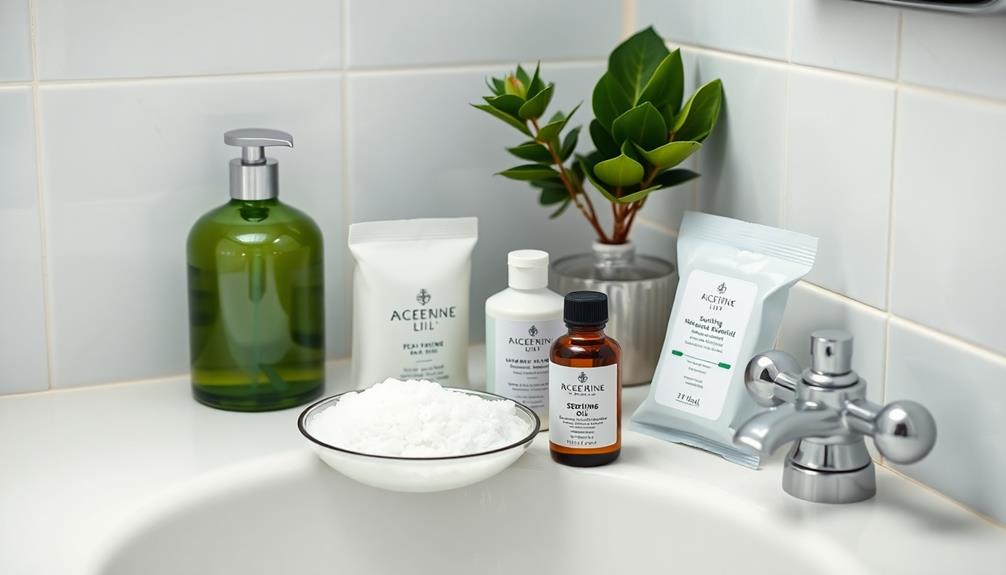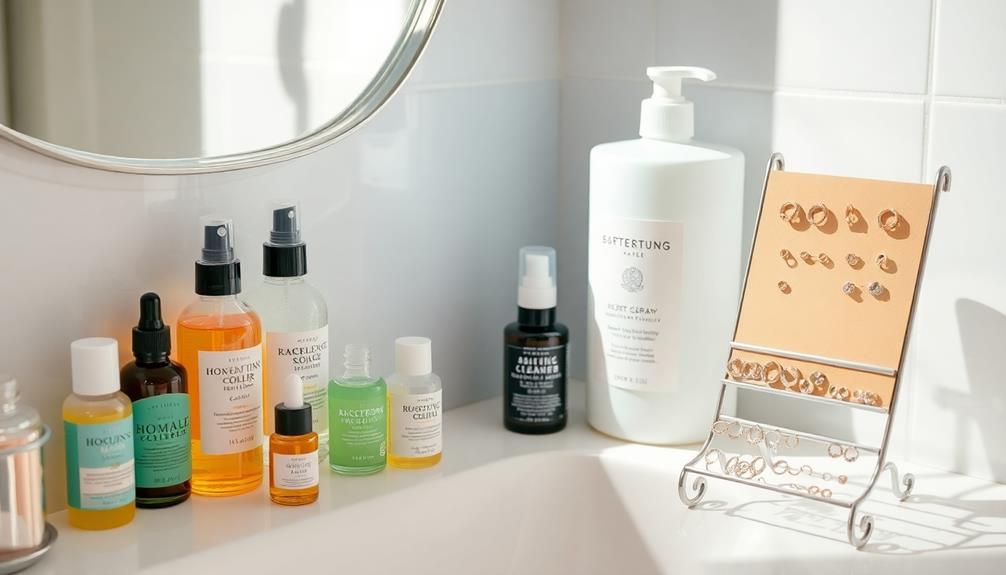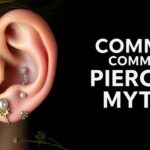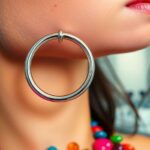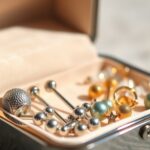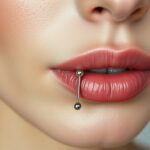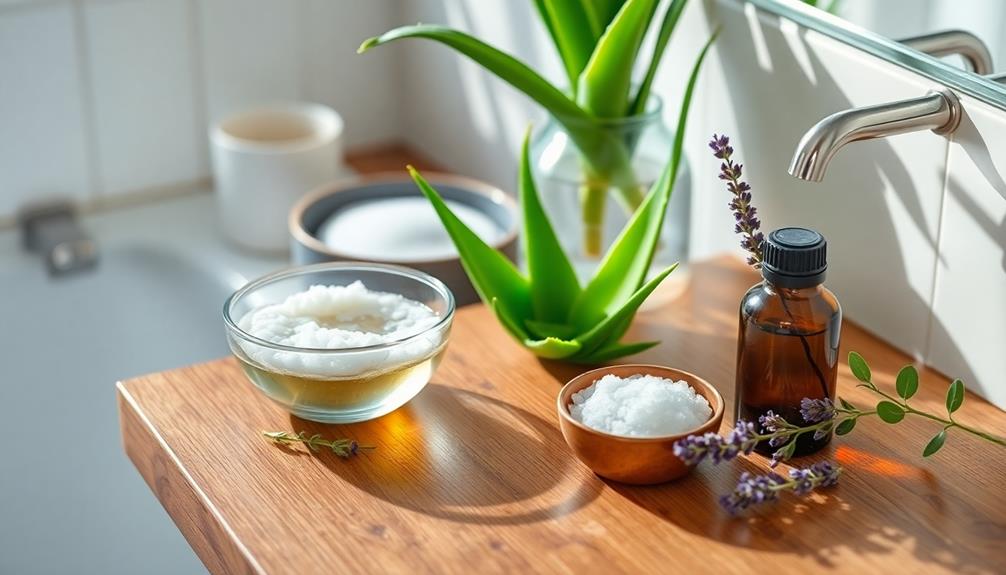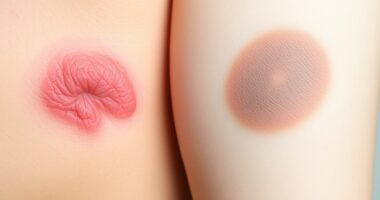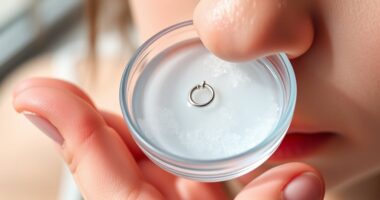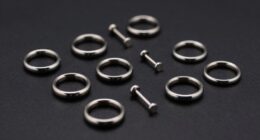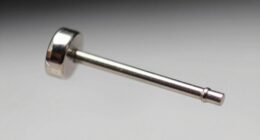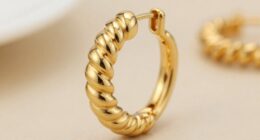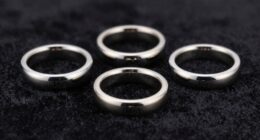You've probably heard some common myths about piercing aftercare, but it's time to set the record straight. Twisting jewelry won't help; it can actually irritate your skin and increase infection risk. Healing times vary greatly, taking anywhere from a few weeks to several months. Using ointments or essential oils isn't advisable either, as they can disrupt healing. Instead, stick to saline solutions, which promote healing without irritation. Understanding these misconceptions can help you take better care of your piercings. For even more tips and insights on effective aftercare, keep exploring.
Key Takeaways
- Piercings generally require weeks to months for complete healing; early cessation of aftercare can prolong healing and increase complications.
- Twisting jewelry does not aid healing and can irritate the skin, increasing the risk of infection.
- Saline solution is the preferred cleaning method; ointments and essential oils can disrupt natural healing and foster bacterial growth.
- Keloids are rare and often confused with irritation bumps; proper aftercare minimizes the risk of complications.
- Professional piercers ensure safe practices and use high-quality, hypoallergenic materials to reduce allergy risks and promote faster healing.
Common Piercing Aftercare Misconceptions
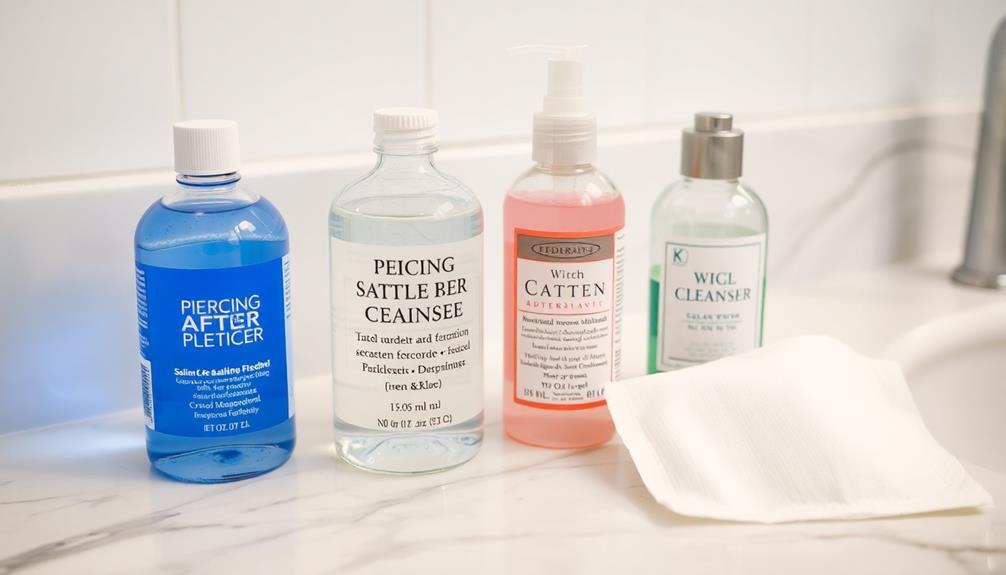
Misconceptions surrounding piercing aftercare can lead to unnecessary complications during your healing process. Many people believe that piercings heal quickly, but in reality, the shortest healing times are at least four weeks, with many requiring several months for full internal healing.
Furthermore, it's essential to recognize that not all piercings heal the same way. Healing times and aftercare requirements vary greatly based on the piercing location and your individual physiology.
A common myth is that twisting your jewelry helps it heal. In fact, this can irritate your skin and prolong your healing time, increasing the risk of piercing infections. Instead, keeping your jewelry still is key to the best recovery.
Using ointments or essential oils on healing piercings is another misconception; these can trap bacteria and irritate sensitive skin. The only recommended cleaning method is a saline solution, which provides gentle care without disruption.
Lastly, over-cleaning is a prevalent misunderstanding. Excessive cleaning can lead to irritation and complications, so aim for a balanced approach with saline.
The Truth About Twisting Jewelry

When it comes to piercing aftercare, the idea that twisting your jewelry can promote healing is a common myth that can do more harm than good.
In reality, twisting your jewelry during the healing process can irritate the skin, leading to complications instead of preventing them. Skin doesn't grow onto jewelry; it naturally separates, making the act of twisting unnecessary.
To guarantee your piercing heals well, consider these important points:
- Gentle Care: Soak the area in saline solution to remove crusties without irritation.
- Minimize Movement: Keeping your jewelry still reduces the risk of piercing bumps and discomfort.
- Educate Yourself: Many professional piercers now advise against twisting jewelry for ideal healing.
- Follow Aftercare Practices: Stick to recommended aftercare routines for better results.
- Listen to Your Body: If you experience pain or irritation, consult a professional piercer.
Healing Time Realities
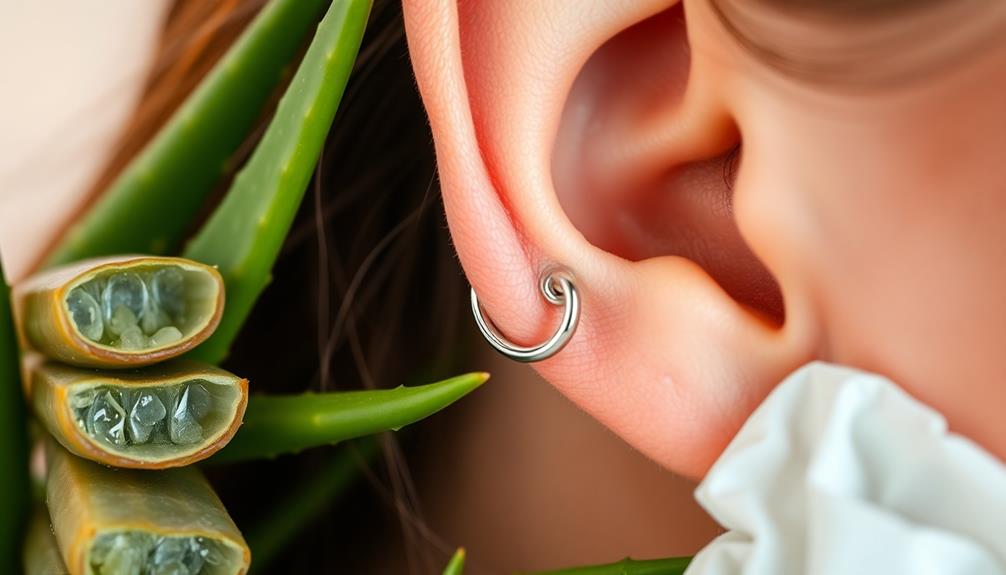
How long does it really take for a piercing to heal? The answer isn't straightforward, as healing times vary greatly depending on the type and location of the piercing. While lobe piercings typically take 6-8 weeks, cartilage piercings may need 3-12 months for complete healing. Many people fall for common myths that claim piercings heal in days. In reality, superficial healing may happen quickly, but internal healing can take much longer.
Your overall health plays an important role, too. Factors like immune system function can greatly influence healing duration. If you stop your aftercare too early, you might prolong the healing process and risk complications. This is why it's vital to follow aftercare instructions thoroughly.
Here's a quick look at healing times for different piercings:
| Piercing Type | Healing Time |
|---|---|
| Lobe | 6-8 weeks |
| Cartilage | 3-12 months |
| Navel | 6 months – 1 year |
| Septum | 6-8 weeks |
| Eyebrow | 6-8 weeks |
Always remember, professional piercings tend to heal faster than DIY attempts!
Myths About Ointments and Oils
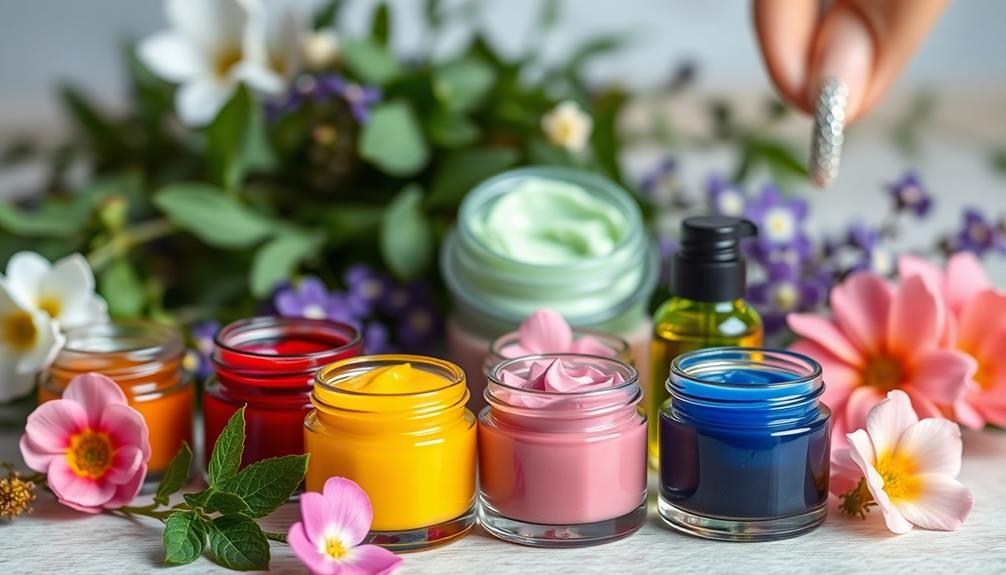
You might think that applying ointments or essential oils can speed up the healing of your piercing, but these products can actually irritate your skin and create more problems.
Instead of helping, they can disrupt the natural healing process and increase the risk of infection. Sticking to a saline solution is your best bet for keeping your piercing clean and promoting proper healing.
Harmful Effects of Ointments
Many people mistakenly believe that using ointments and oils can expedite the healing process for piercings. However, these products often do more harm than good. Instead of promoting proper aftercare, they can trap bacteria and moisture, making it harder for your skin to breathe and prolonging the healing of your piercing.
Consider these points:
- Antibiotic ointments can seal in bacteria, increasing infection risk.
- Essential oils may irritate unhealed skin, worsening the situation.
- Moist environments foster bacterial growth, contrary to popular belief.
- Harsh creams can clog pores, leading to irritation bumps.
- Saline solution is a gentle, effective option for cleaning.
When you're focused on healing your piercing, stick to methods that support the body's natural healing process.
Relying on ointments and oils can complicate things, resulting in longer healing times and unnecessary discomfort.
For the best results, prioritize proper aftercare with saline solutions. Your skin will thank you as it heals more effectively without the added risks associated with ointments and oils.
Choose wisely and give your body the chance to heal naturally!
Essential Oils Irritate Skin
Essential oils, often touted for their healing properties, can actually irritate unhealed skin and delay the recovery of your piercing. While it may be tempting to use essential oils like tea tree oil, they can cause more harm than good during the healing process.
For instance, essential oils for skin health can be beneficial in certain contexts but aren't suitable for fresh piercings. Applying these oils directly to your fresh piercing can lead to irritation, discomfort, and even prolonged healing times.
In your aftercare regimen, relying on essential oils or ointments is discouraged. These substances can create a moist environment that traps bacteria, increasing the risk of infection. Instead of promoting healing, they may hinder it by preventing your skin from breathing.
The delicate balance of your body's natural healing processes can be disrupted by unnecessary chemicals.
For ideal healing piercings, it's best to stick with saline solution for cleaning. Saline is gentle, effective, and free from the risks associated with essential oils and ointments.
Saline Solution Preference
While it's tempting to reach for ointments or essential oils in hopes of speeding up the healing process, these products can actually do more harm than good. The best approach is to use a saline solution, as it's the only recommended product for cleaning healing piercings. Ointments can trap bacteria and create a moist environment, leading to infections.
Here are some key reasons to stick with saline solutions:
- Promotes healing: Saline solutions maintain the body's natural salinity balance, fostering ideal healing conditions.
- Prevents irritation: Unlike ointments, saline won't block oxygen or moisture from reaching the skin, essential for proper tissue recovery.
- Avoids complications: Essential oils can irritate unhealed skin and should only be used once a piercing is fully healed.
- Commercially formulated: Store-bought saline solutions achieve the correct isotonic concentration, unlike many homemade options.
- Simple and effective: Keeping your piercing clean with saline is straightforward and minimizes the risk of unwanted issues.
Understanding Piercing Infections
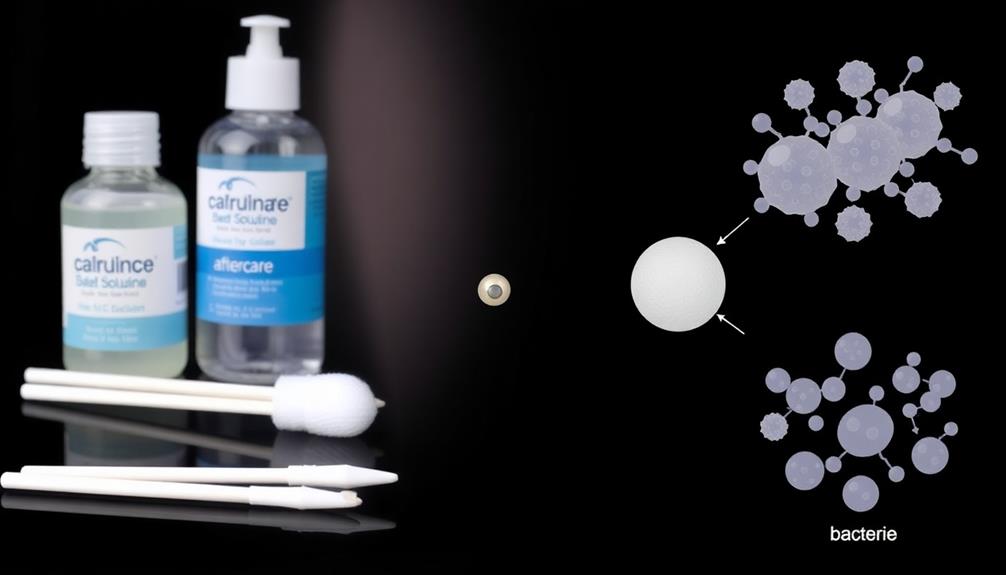
When you get a piercing, it's easy to mistake normal healing symptoms like swelling and redness for an infection.
Understanding the difference is essential for effective aftercare and infection prevention.
Misinterpreting Healing Symptoms
Misunderstanding healing symptoms can lead to unnecessary panic about your new piercing. Many people misinterpret normal responses, like redness and slight discharge, as signs of infection. However, these symptoms can be typical during the healing process.
True infections are rare and usually manifest with severe symptoms, such as:
- Persistent swelling
- Intense warmth around the piercing
- Deep redness that doesn't fade
- Pus that doesn't resolve on its own
- Fever or overall malaise
It's vital to differentiate between common piercing bumps, which are often harmless, and keloids, which are rare and arise from excessive collagen production during healing.
Proper aftercare, like using saline solutions and avoiding harsh chemicals, plays a significant role in reducing the risk of true infections and promoting healthy healing.
When you notice any unusual symptoms, consulting a professional piercer can be invaluable. They can help assess your situation and guide you on whether treatment or medical evaluation is necessary.
Infection Prevention Strategies
Your piercing's health depends on effective infection prevention strategies that guarantee a smooth healing process. Proper aftercare is vital, as it keeps the area clean and promotes healing without irritation. Using a saline solution regularly can greatly reduce the risk of infections in new piercings.
Remember, true infections are rare and often misidentified. Symptoms like mild redness and discharge can be normal healing signs rather than indicators of infection. It's important to educate yourself on the differences between these normal symptoms and actual infections to prevent unnecessary anxiety.
To further protect your piercing, maintain cleanliness by washing your hands before touching it, avoiding contact with the piercing, and handling jewelry properly.
If you notice severe redness, swelling, warmth, or pus, these could signal a legitimate infection that requires medical evaluation and intervention.
Keloids and Cartilage Piercings

Although keloids can be a concern for some individuals considering cartilage piercings, it's important to recognize that they're quite rare and largely influenced by genetics.
In fact, less than 10% of the population experiences keloids, and a cartilage piercing doesn't guarantee their formation. Most bumps you encounter during the healing process are irritation bumps, which typically resolve on their own.
Proper piercing care and hygiene can further reduce any risks associated with healing.
Understanding the difference between keloids and normal healing symptoms is essential. Here are some key points to keep in mind:
- Keloids arise from excessive collagen during healing.
- Most individuals will experience normal healing bumps, not keloids.
- A family history of keloids may increase your risk.
- Proper aftercare can minimize irritation and complications.
- Most healing bumps require no intervention.
Safe Piercing Methods

When considering a new piercing, choosing safe methods is vital to guarantee a positive experience and minimize complications. One of the best practices is to opt for professional piercers who use sterile, single-use needles.
Unlike piercing guns, which can cause tissue damage and increase the risk of infection, needles create cleaner holes that promote faster healing.
Before you get pierced, research the piercer's credentials and experience. Verify they follow safety and hygiene standards, as this is essential for your health.
The Association of Professional Piercers (APP) recommends using high-quality materials like titanium or surgical steel for initial jewelry. These options reduce the likelihood of allergic reactions and complications.
Avoid DIY piercings at all costs. They lack the sterile environment and expertise necessary for safe procedures.
By choosing the right professional and materials, you greatly lower the risk of infection and guarantee a smoother healing process.
Jewelry Material Misunderstandings
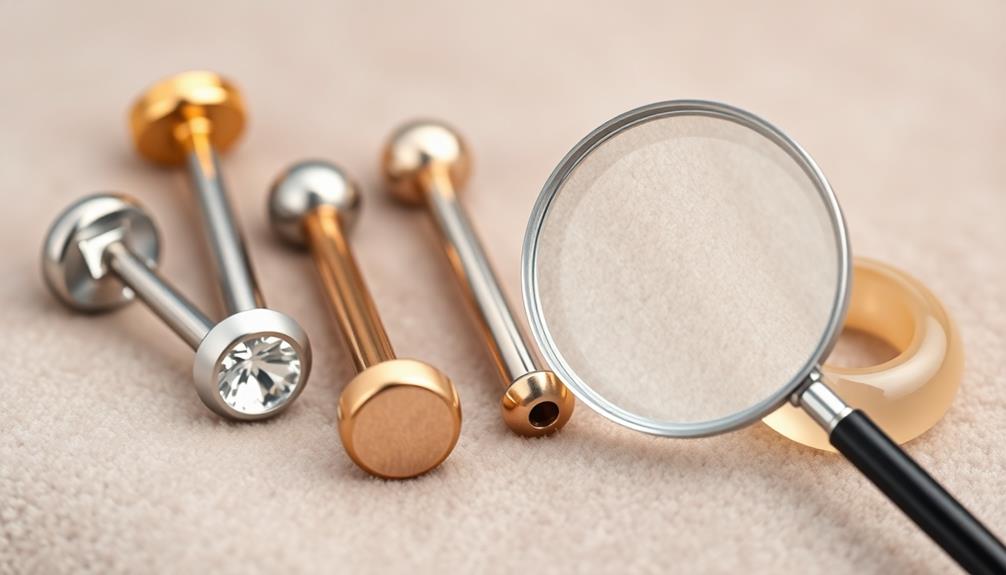
When you get a new piercing, the material of your jewelry really matters.
Choosing high-quality, hypoallergenic options like titanium can help prevent allergic reactions and irritation during healing.
It's crucial to understand which materials are safe for your body to guarantee a smooth recovery.
Safe Materials for Jewelry
Choosing the right materials for your piercing jewelry is vital for promoting healing and preventing complications. Many people fall for common piercing myths, believing any jewelry will suffice.
In reality, using safe materials for jewelry is important for a smooth healing process. Herbal tea, for instance, can aid in relaxation and stress reduction, which may be beneficial during the healing process health benefits of herbal teas.
Here's what you need to know:
- Titanium: Lightweight, strong, and hypoallergenic.
- Surgical stainless steel: Durable and resistant to corrosion, but verify it's nickel-free.
- Niobium: Safe and non-reactive, perfect for sensitive skin.
- Gold: Use only 14k or higher to avoid allergic reactions.
- Avoid acrylic and plastic: These materials can irritate and harbor bacteria.
Allergies and Metal Sensitivities
Understanding allergies and metal sensitivities is vital for anyone considering body piercings. While metal allergies, like nickel sensitivity, can cause localized reactions—such as redness and swelling—they're relatively rare, affecting less than 10% of people.
Recent developments in AI's Role in Cybersecurity and Other Sectors have also highlighted the significance of data-driven decision-making in various fields, which can be applied to improving safety measures in body piercing practices. To minimize the risk of allergic reactions, opt for high-quality materials like surgical-grade titanium or stainless steel for your new piercings. These metals are less likely to trigger sensitivities compared to cheaper alternatives.
It's essential to choose jewelry specifically designed for fresh piercings. Materials like acrylic or plated metals can worsen irritation and lead to complications during the healing process.
If you have known metal sensitivities, inform your piercer beforehand to make certain they use hypoallergenic materials. This step greatly enhances the likelihood of a smooth and successful healing experience.
Keep an eye on your healing process; symptoms of metal allergies can sometimes mimic normal healing responses. If you notice persistent issues that don't improve with proper care, consult a professional piercer or healthcare provider.
Being proactive about your allergies and metal sensitivities will help make certain your piercings heal without complications.
The Role of Professional Advice
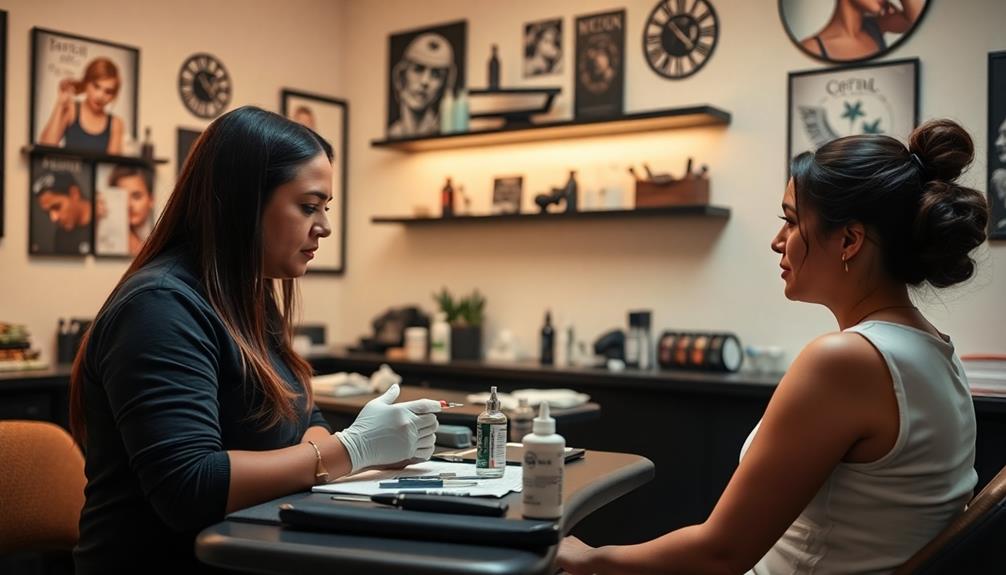
Professional advice plays an essential role in guaranteeing your piercing heals properly. When you consult with professional piercers, you receive tailored aftercare instructions that address the specific needs of your piercing location.
This personalized guidance not only helps you understand the unique healing challenges but also minimizes risks associated with healing piercings.
By engaging with a professional piercer, you can:
- Identify potential risks and address complications early.
- Learn the importance of using isotonic saline solutions for cleaning.
- Discover proper jewelry materials to reduce allergic reactions.
- Build a trusting relationship that encourages open communication.
- Seek clarification on aftercare to guarantee better healing outcomes.
Best Practices for Aftercare

Taking care of your new piercing is important for making sure it heals properly and stays infection-free. The best practice begins with using a saline solution to clean your piercing site. This gentle solution promotes healing without irritating the tissue.
Remember, over-cleaning can be harmful, so stick to cleaning only twice a day and avoid excessive scrubbing.
It's also important not to twist or rotate your jewelry during the healing process, as this can lead to irritation and complications. Make certain your jewelry fits properly; it shouldn't be too tight, as that can restrict blood flow and drainage, hindering your healing process.
Following the aftercare instructions provided by your professional piercer is essential. They'll guide you on how to care for your specific type of piercing.
Keep an eye out for any signs of infection, such as increased redness or discharge, and don't hesitate to reach out to a healthcare provider if you notice anything unusual.
Frequently Asked Questions
What Does Psychology Say About Piercings?
Psychology suggests piercings enhance self-expression, boost self-esteem, and provide a sense of autonomy. They can mark significant life changes, acting as coping mechanisms that promote empowerment, resilience, and creativity in your personal journey.
Do Some Peoples Piercings Never Heal?
You might wonder why some people's piercings never seem to heal. Factors like improper care, health issues, or allergic reactions can all play a part, complicating the healing process and leaving you frustrated.
Are Piercings Biblically Wrong?
You might wonder if piercings are biblically wrong. Interpretations vary widely, with some seeing Old Covenant prohibitions as culturally specific. Ultimately, it's your beliefs and understanding of scripture that shape your perspective on piercings.
What Does Chinese Medicine Say About Piercings?
In Traditional Chinese Medicine, piercings can influence your body's energy flow, or Qi. By targeting specific acupuncture points, they may help alleviate issues like headaches or digestive problems, promoting overall health and balance during healing.
Conclusion
In the world of piercing aftercare, it's easy to get caught up in myths that can lead you astray. By knowing the facts, you can navigate the healing process like a pro. Don't twist your jewelry or overuse ointments; instead, follow best practices and rely on professional advice. Remember, a little knowledge goes a long way, so you can keep your piercings looking great while ensuring they heal properly. Stay informed and enjoy your new look!

